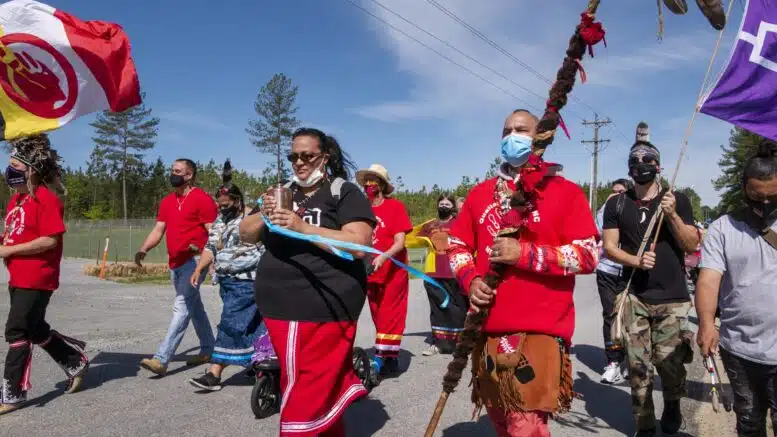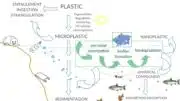By Will Atwater
The organizers of the first Earth Day event in 1970 wanted to raise awareness of the environment in the collective consciousness. Now, a half-century later, environmentalists are looking to give nature personhood status.
Many contend that environmental protections like the Clean Water Act have proven insufficient to shield wetlands from growing developmental pressures. Nor have laws been sufficient to prevent waterways from being polluted by per- and polyfluoroalkyl substances (PFAS), microplastics and other contaminants as climate change exacerbates the problem.
“We are losing our suicidal war against nature,” United Nations Secretary-General António Guterres said in 2021 during the U.N. Biodiversity Conference. “Our two-century-long experiment with burning fossil fuels, destroying forests, wilderness and oceans and degrading the land has caused a biosphere catastrophe.”
What seems to be absent from the conversation is that human health is inextricably tied to the planet’s health, including the health of animals.
“In a globalized world with 8 billion people, we can no longer ignore our interconnectedness with the wildlife and ecosystems around us,” said Susan Lieberman, Wildlife Conservation Society vice president for international policy, in a news release about preventing future pandemics. “We must change humanity’s relationship with nature if we want to prevent the next pandemic of zoonotic origin.”
What can be done?
Environmentalists are heeding Guterres’ warning and looking to fight back. They are drawing inspiration from Indigenous principles to counteract what they see as a global attack on the natural environment by corporate interests. The key shift in their thinking is to view the biosphere as a living thing with the same rights as humans — to exist and thrive.
This effort is called the Rights of Nature movement.
In 2023, Crystal Cavalier-Keck, executive director of 7 Directions of Service, an Indigenous environmental advocacy collective based on Occaneechi-Saponi homelands in rural North Carolina, worked with N.C. State Rep. Pricey Harrison (D-Guilford) to establish The Rights of the Haw River Ecosystem River Act (HB795). Keck described the concept as “universal laws of nature” passed down by Indigenous ancestors, filtered through a “Western legal framework.”

“We’ve developed this attitude of what benefits can we extract from nature rather than protecting it for future generations, and for the ecosystem itself,” Harrison said.
Keck collaborated with Harrison to produce the The Rights of the Haw River Ecosystem River Act to stop the Mountain Valley Pipeline Southgate Extension “from coming through Burlington where it was going to cross the Haw River.”
Keck drew on the connection between people and the environment.
“We are human, we are made of water, you know,” Keck said. She added: “At different times of your life, you’re either 70 to 80 percent water. When people get to the actual core […] we can have this common ground that we can stand on — that this river should be protected.”
Taking the long view
Keck said the advocacy work she and others did to raise awareness about the potential environmental harms posed by the pipeline stopped it from being routed through Alamance County. That rerouting also eliminated further impacts on the Haw River, which has been fouled by industrial pollutants such as 1,4-dioxane and PFAS.
However, HB795 did not advance in the last session, making it ineligible to be voted on during the legislative short session that starts at the end of April.
Despite what some would see as a failure, Keck is partnering with Harrison again to introduce legislation to protect the Dan River, using similar language as the Haw River Act. The bill is designed to remove the Dan River as a potential path for the MVP Southgate Extension and other environmental threats, Keck said.
Harrison said she is pretty sure that The Rights of the Dan River Act will not be heard during the short session but is taking the long view.
“There have been plenty of bills over the years and plenty of policies and laws that have taken 10 to 15 years to get enacted because [they were] such a new concept,” she said. “At the legislature, we’re not really going in the right direction on environmental protection. We’re just rolling back protections and not thinking about more.”
Harrison said she hopes that during the upcoming session she can drum up enough support among her colleagues to hold a hearing on HB795, so that they can come away with more understanding and “maybe refile next year.”
Prioritizing the needs of ecosystems
To date, there’s a growing list of countries that have national rights of nature laws on the books, including Bolivia, Ecuador and Panama. Other countries, such as India and New Zealand, have some local statutes.
The laws prioritize “the needs of the ecosystem and not the needs of humanity,” marine biologist Callie Veelenturf told CBS correspondent Ben Tracy during a 2023 interview. Veelenturf worked with Panamanian government officials to establish rights of nature statutes to protect leatherback turtles, an endangered species vulnerable to fishing nets, plastic pollution and rising seas, she said.
CBS reported that the Panamanian government recently used the new law to shut down a billion-dollar copper mine because it threatened the environment.
“Every Panamanian citizen, every human, can use this bill, go to court and make sure that we defend the rights of nature,” said Juan Diego Vasquez, a member of the National Assembly of Panama. “This will not be a bill that’s gonna be left in a cabinet. It’s going to be used when it needs to be used.”
‘Sooner rather than later’
In the U.S., some cities, such as Pittsburgh, Pennsylvania, Lafayette, Colorado, and Shapleigh, Maine, have established rights of nature laws.
“State legislation on the rights of nature is needed to protect ecosystems and species in North Carolina and across the U.S.,” said Mari Margil, executive director of the Center for Democratic and Environmental Rights, an environmental advocacy organization. “We hope this will occur sooner rather than later. Meaningful social change, in this case, to protect the rights of the natural world upon which we all depend, however, takes time.”
If rights of nature laws are going to take hold on the national level, climate activist Karenna Gore said, people need to change their mindset away from the one that springs from the Doctrine of Discovery.
“In the mid-15th century, there was a marriage between a certain interpretation of Christianity and the agenda of empire and colonization,” Gore said during a recent webinar on the rights of nature. “This particularly has to do with the concept in the book of Genesis of dominion, that man is made in the image of God and is given dominion over the earth.”
Along the way, she argued, the mindset evolved from being predominantly a Christian one to being a market-driven model that views nature as a commodity.
The Rights of Nature movement requires that human beings view nature — and each other — as living entities with equal rights rather than as things to be exploited for economic or political gain.
That’s proving to be a tall order, but one worth considering as the world prepares to celebrate another Earth Day.
For those interested in learning more about the rights of nature, 7 Directions of Service is planning a Rights of Nature Weekend from May 30 through June 2 at Haw River State Park. According to the organization’s website, the event will “explore this Indigenous-driven legal framework and its application to protect natural spaces.”










